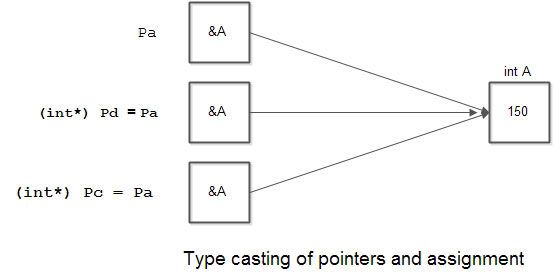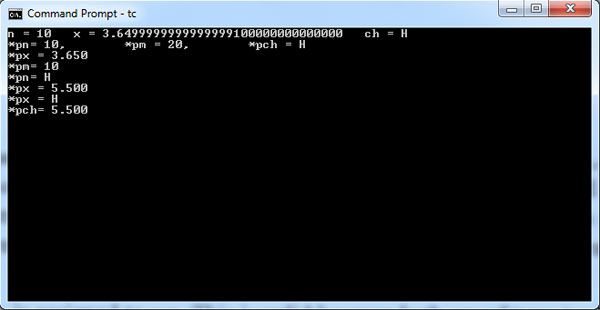C Casting Function Pointers
According to C specification casting function pointers results in unspecified behavior but many compilers eg. Pa is declared as a pointer to int variables.

In A Program We Might Have Declared A Variable As Of One Datatype For Some Reason We Would Need To Have Same Variable In Another It Cast C Programming Type
Im writing test code in C and I need 100 pointers to unique functions.

C casting function pointers. To do so simply declare the function parameter as a pointer type. It is termed a call by reference. Function pointer in C programming language can make code faster easy short and efficient without occupying any large space in the code as the function pointer contains the start of the executable code.
Distinguishing function type signatures. Function Pointer in C. Can we store a pointer to function into a pointer to function variable of another type ie.
Later you can store a function into a function pointer type like this. The use of pointers as function parameters is to hold point at the addresses of various arguments that are passed during the function calls. Cast the void argument and set a pointer of known pointee type equal to it.
Casting a function pointer to a type that takes fewer arguments as shown in the argument that started this thread. You have a number of misconceptions and other problems as well. For example a simple qsort function can be used to sort arrays in ascending order or descending or by any other order in case of array of structures.
But the function MD5_Init actually takes a pointer to MD5_CTX which apparently is not the same as pointer to void. Visit to know more about the Function Pointer in C. Function pointers casting in C Converting a void to a function pointer directly is not allowed should not compile using any of the casts in C9803.
Type Casting Of Pointers in C. Casting an int to a function pointer in C 8 posts. Following is a simple example where we pass an unsigned long pointer to a function and change the value inside the function which reflects back in the calling function.
Steps 1 and 2 are often combined to cast and dereference in one expression Compare values to determine the result to return. So void func_iiint int. The C standard specifically allows a pointer to a function of one type to be converted to a pointer to a function of another type with a suitable cast.
Just to be safe I would re-declare func1 and func2 to take void and then cast these pointers to char and int as required. The Standard also says though that when a call is made the type of the function pointer must agree with that of the called function or else you get undefined behavior. We can also use a function name to get the address of a function pointer.
DerivedFoo rather than what you wrote which is ill-formed. Struct in_addr Casts the first element of the h_addr_list into a in_addr pointer then de-references it. Function pointer casts.
LocalHost-h_addr_list De-references the h_addr_list member. C compilers HAVE allowed casting data pointers to function pointers in the Posix compatible mode. Implementing a comparison function follows a similar pattern.
This is purpose of casting function pointers just like usual pointers. Into a function that accepts no arguments. Web site - httphomeflash-gordonmeuk.
This C style cast maps pretty much to what we normally expect of a reinterpret_cast in C. It is conditionally supported in C0x an implementation may choose to define the behavior and if it does define it then it must do what the standard says it should do. Casting function pointers is generally unsafe and needs to be avoided as different data types may have different representations -- for example a void must be able to express every possible address as it could have been converted from a char while a MyStruct is guaranteed to have a few of the least significant bits clear as any valid object would be aligned.
PfnFoo reinterpret_cast. A C compiler which didnt allow this of a reinterpret_cast in Posix mode probably ignores many other things of Posix too and Id have serious doubts. We can cast a function pointer to another function pointer type but cannot call a function using casted pointer if the function pointer is not compatible with the function to be called.
In C we can use function pointers to avoid code redundancy. C programming allows passing a pointer to a function. If a function is called through a pointer to a function having a signature different from the functions actual signature the results are undefined.
Breaking it down step by step. When calling a function that expects a void you can pass any kind of object pointer you want because the types are compatible for the implied assignment of the argument to the parameter. A pointer to void can store an address to any data type and in C is automatically cast to any other pointer type on assignment but it must be explicitly cast if dereferenced inline.
Int x 4. The Standard says that its possible to convert a function pointer from one type to another without harm so the casts using the types above are all right. In the following code lines A is an int type variable D is variable of type double and ch is a variable of type char.
A pointer to a function may only be cast to another pointer to a function type. You must form the pointer to member with the qulaified name ie. In the C language castingis a construct to view a data object temporarily as another data type.
We saw that pointer values may be assigned to pointers of same type. This is a guide to Function Pointer in C. To help you with casting functions to pointers you can define an alias for a function pointer type as follows.
However pointers may be type cast from one type to another type. Historically there has been plenty of reasons why pointers to functions and pointers to. Gcc do what you expect them to do because function pointer is just an address in memory.
You use a reinterpret cast C-syle cast or function cast. Typedef int math_operatorint int. Here the user can type cast the result to make it of a particular data type.
You can cast a pointer to another pointer of the same IBM ipointer type. Not only this with function pointers and void pointers it is possible to use qsort for any data type. Function pointers should not be converted to char or void both of which are intended for pointers to data objects in the vocabulary of the C standard.
If the result is later converted back to the original pointer type again by the appropriate cast the reconverted pointer. You can also define a type for a function that takes and returns values. My personal preference is for keeping the number of arguments small and using suggestion 1 which is why it was my first suggestion--Flash Gordon living in interesting times.
Passing pointers to functions in C. Dereference the typed pointer to access the value. When you cast pointers especially for non-data object pointers consider the following characteristics and constraints.
Void MD5_InitMD5_CTX c. Returns a pointer to a hostent type which points to a static variable or maybe global that is inside the gethostbyname function.

Static Cast In C Static Cast Method Journaldev

Type Casting Of Pointers In C Computer Notes

Type Casting Of Pointers In C Computer Notes
In C Is It Dangerous To Cast A Function With A Typed Pointer To One With A Void Pointer Or Will The Typed Pointer Always Map To The Void One Quora
Posting Komentar untuk "C Casting Function Pointers"